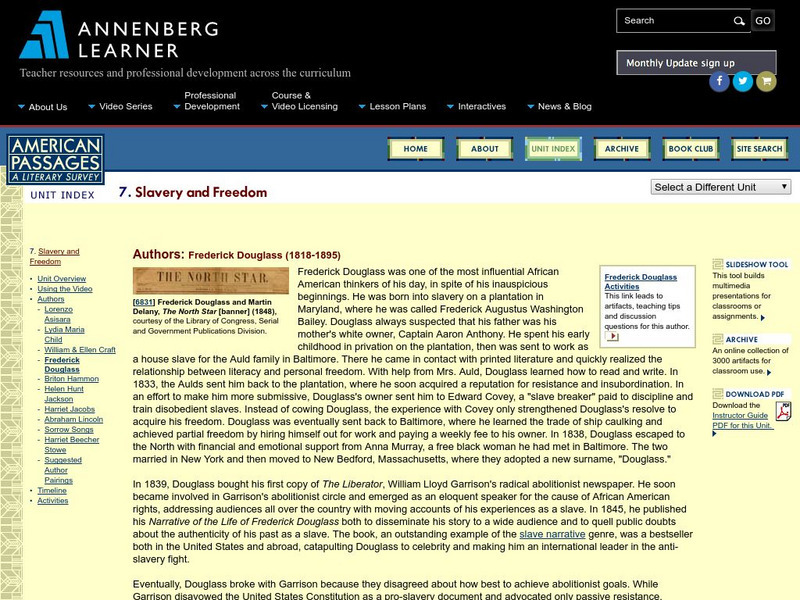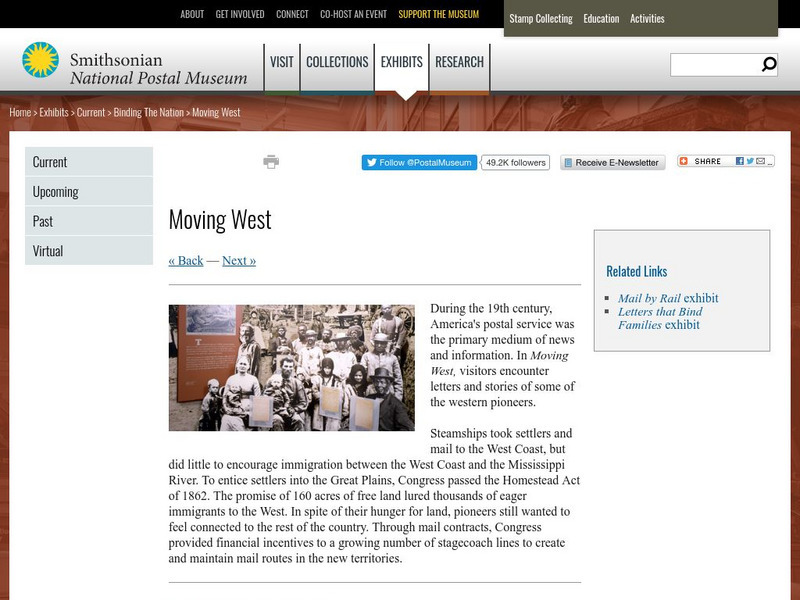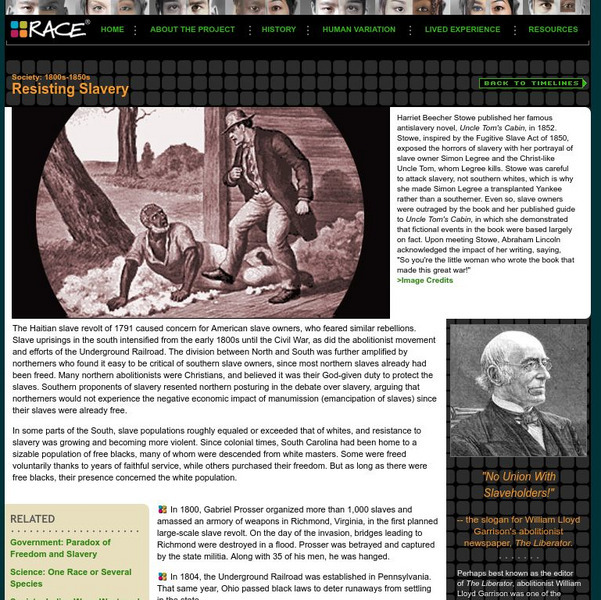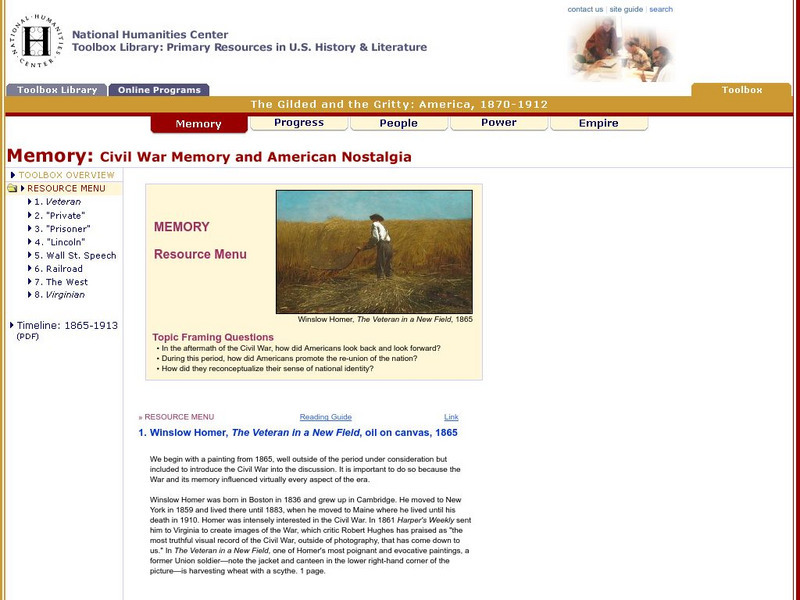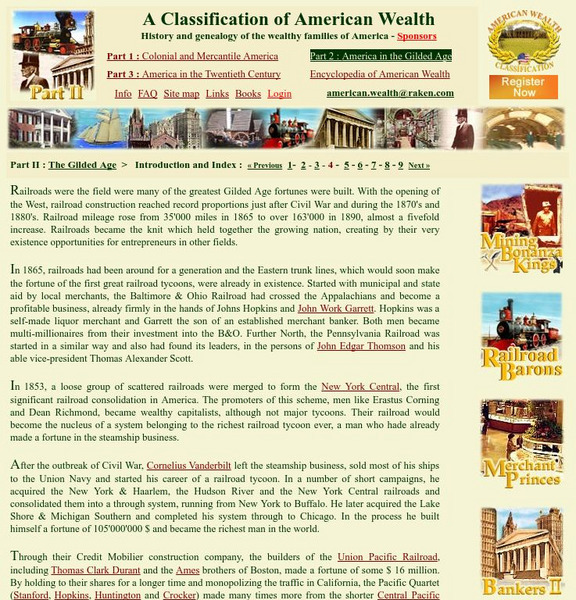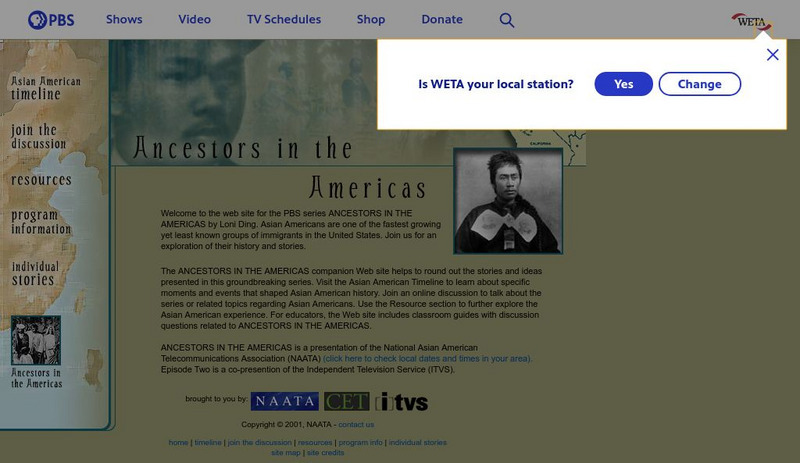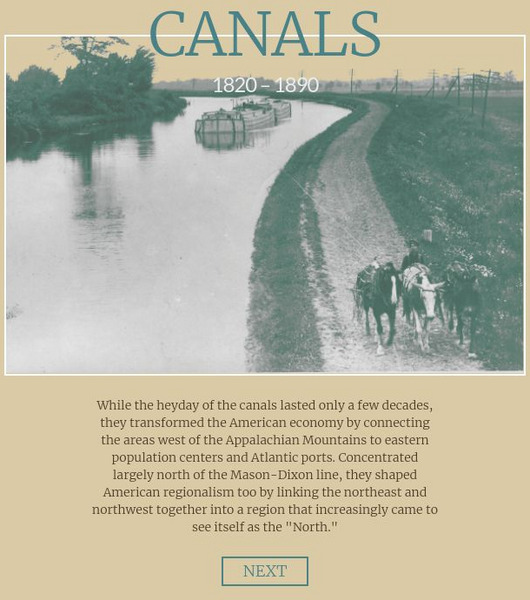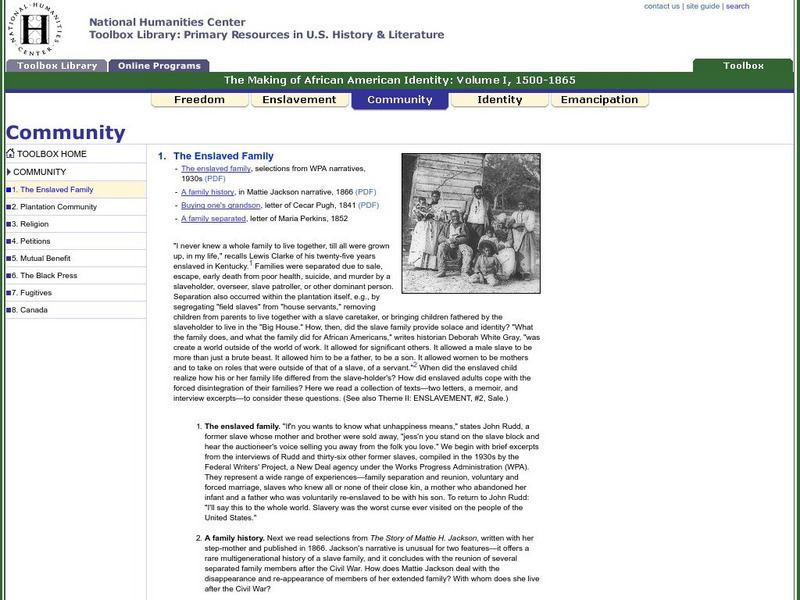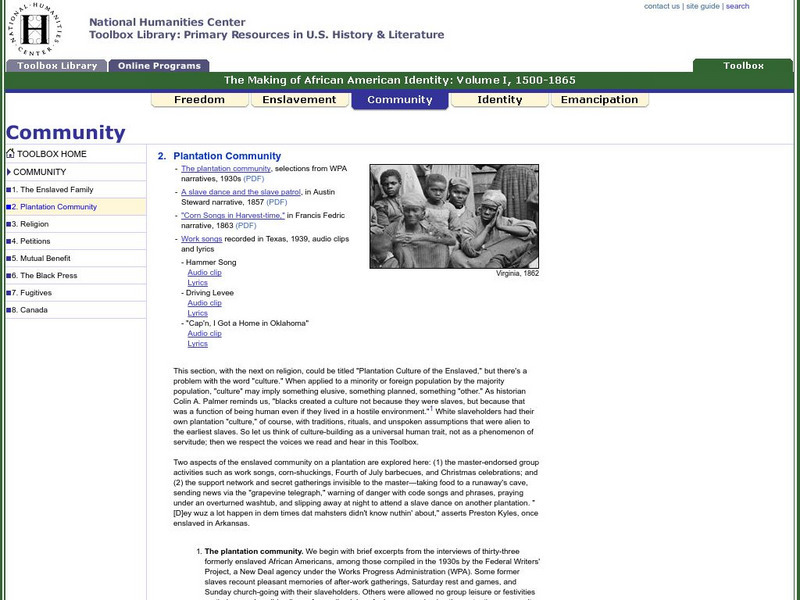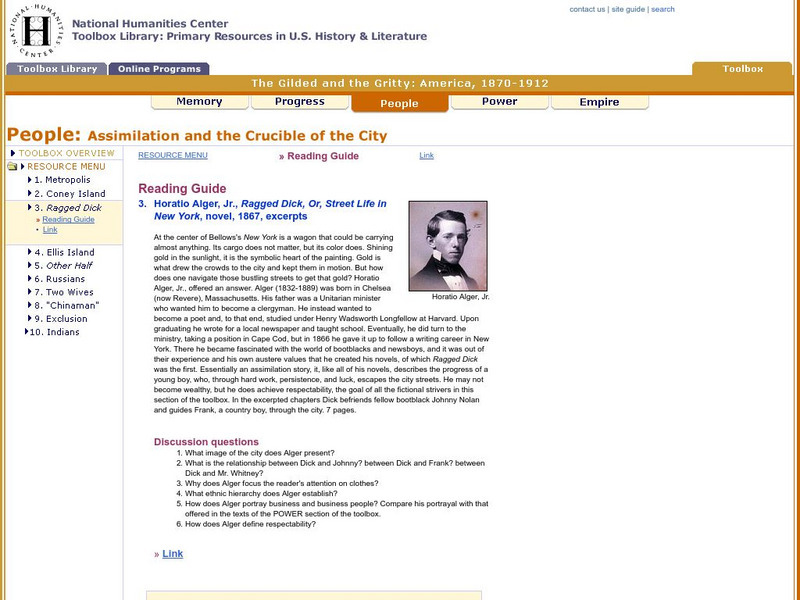Annenberg Foundation
Annenberg Learner: American Passages: Slavery and Freedom: Frederick Douglass
This concise biography presents author/journalist Frederick Douglass, who was groundbreaking in his slave narratives and establishing "The North Star" abolitionist periodical in mid-nineteenth-century America. See "Frederick Douglass...
Smithsonian Institution
National Postal Museum: Moving West
The National Postal Museum provides an intimate look at how America's postal service expanded to meet the needs of westward-moving settlers during the nineteenth century. Content includes a selection of letters written at the time, a...
Other
Understanding Race: Society: 1800 1850s: Resisting Slavery
An overview of slave revolts and abolitionist efforts during the first half of the nineteenth century, leading up until the Civil War. Read about the Underground Railroad, the colonization movement, and various anti-slavery books.
National Humanities Center
National Humanities Center: Toolbox Library: The West, the Gilded and the Gritty: America, 1870 1912
Four nineteenth-century landscape paintings that suggest the meaning of the West in American life.
National Humanities Center
National Humanities Center: Toolbox Library: Memory, the Gilded and the Gritty: America, 1870 1912
Twelve primary sources - historical documents, literary texts, and visual images - that explore ways in which the memory of the Civil War affected American life in the last quarter of the nineteenth century.
Gilder Lehrman Institute of American History
Gilder Lehrman Institute: Post Civil War America
[Free Registration/Login Required] "A variety of materials demonstrates the rise and fall of civil rights for African Americans during the latter half of the nineteenth century, including constitutional amendments, sharecropper...
Other
A Classification of American Wealth: America in the Gilded Age
This site's section, which is part of a larger article on the Gilded Age, focuses on the railroad which began to grow in the latter half of the nineteenth century.
PBS
Pbs: Ancestors in the Americas
Site examines the social, political, and economic issues that influenced the first Asian migration to the Americas in the eighteenth and nineteenth centuries. Includes guidelines for helping students distinguish truthful, historically...
Michigan State University
Michigan State University: Digital Center: Feeding America
Digital database of American cookbooks from the eighteenth, nineteenth, and twentieth centuries provides insights into the social history of Americans across three centuries through a consideration of women's labor in the household,...
Library of Congress
Loc: Learning Page: Labor in America
A rich collection of resources, including primary sources, student activities, and lesson plans, to support study of Americans at work in the late nineteenth and early twentieth centuries.
University of Richmond
American Panorama: Canals
Excellent resource maps the growth of canals and economic development in the nineteenth-century by presenting data about the commodities and products that moved across the canals and shows the spaces that canals connected.
Contemplator
Popular Songs in American History: Rosalie, the Prairie Flower
This page presents the lyrics to a famous folk song of the nineteenth century.
National Humanities Center
National Humanities Center: Toolbox Library: Business, Making of African American Identity: V. 2
A painting and an appeal that explore the role business played in black uplift in nineteenth-century America. This resource focuses on the work of Edward Bannister (1828-1901), one of the leading black painters of the nineteenth century.
National Humanities Center
National Humanities Center: Toolbox Library: Family, Making of African American Identity: V. 2
A short story and photographs that illustrate the role family played in shaping African American identity in nineteenth-century America. A link to "The Stones of the Village" by Alice Dunbar-Nelson supports this concept.
National Humanities Center
National Humanities Center: Toolbox Library: Racial Politics, Making of African American Identity: V. 2
Chapter from a novel and images that illustrate black political action in late-nineteenth-century America. Frances Harper's 1892 novel Iola Leroy, is examined, covering topics of white supremacy and racial justice.
National Humanities Center
National Humanities Center: Toolbox Library: Race Problem, Making of African American Identity: V. 2
A poem, an address, and a painting that illustrate black political struggle in late-nineteenth-century America. This series of resources characterize "the Negro Problem" as "a concrete test of the underlying principles of the great...
National Humanities Center
National Humanities Center: Toolbox Library: Making of African American Identity: Segregation
A Supreme Court decision, a chapter from a novel, and an editorial that explore segregation in late-nineteenth-century America. This resource focuses primarily on Plessy v. Ferguson, and the complexities that followed from this ruling.
National Humanities Center
National Humanities Center: Toolbox Library: Power: Taming the Octopus: The Image of the Octopus
Six versions of the octopus, a pervasive image in late-nineteenth-century America, that illustrate the extensive and corrosive power held by corporations over American political and economic life. Reading guide with discussion questions.
Other
Boston Women's Heritage Trail: Sarah Josepha Hale
Although few know her name today, Sarah Josepha Hale was one of the most influential women in nineteenth century America. She used her position as editor of Godey's Lady's Book to effect a wide range of social changes, including the...
PBS
Wnet: Thirteen: Yearning to Breathe Free: Muckrakers and Activism [Pdf]
A lesson plan from the producers of the 16-episode PBS series "Freedom: A History of US" that leads learners through an examination of the role of muckrakers in the development of investigative journalism. Young scholars work to identify...
National Gallery of Art
National Gallery of Art: Inness in the Countryside
Discussion of a landscape painting by George Inness will introduce students to the impact of the railroad on the countryside in mid-nineteenth-century America. They will depict this same scenery as they envision it in the past and in the...
National Humanities Center
National Humanities Center: Toolbox Library: The Enslaved Family, Making of African American Identity: Vol. 1
This site offers two letters and a memoir from the mid-nineteenth century, and interviews from the early-twentieth century, about the importance and the roles of enslaved families.
National Humanities Center
National Humanities Center: Toolbox Library: Plantation Community, Making of African American Identity: V. 1
Various retrospective oral accounts from the early-twentieth century and two narratives from the mid-nineteenth century that examine the work, interrelationships, dangers, and lives of slaves on southern plantations.
National Humanities Center
National Humanities Center: Toolbox Library: People: Assimilation and the Crucible of the City: Street Life in New York
Excerpt from Horatio Alger's well-known novel, "Ragged Dick, Or, Street Life in New York," that describes the values and attitudes needed to make it in the capitalistic, urban America of the late-nineteenth century.


